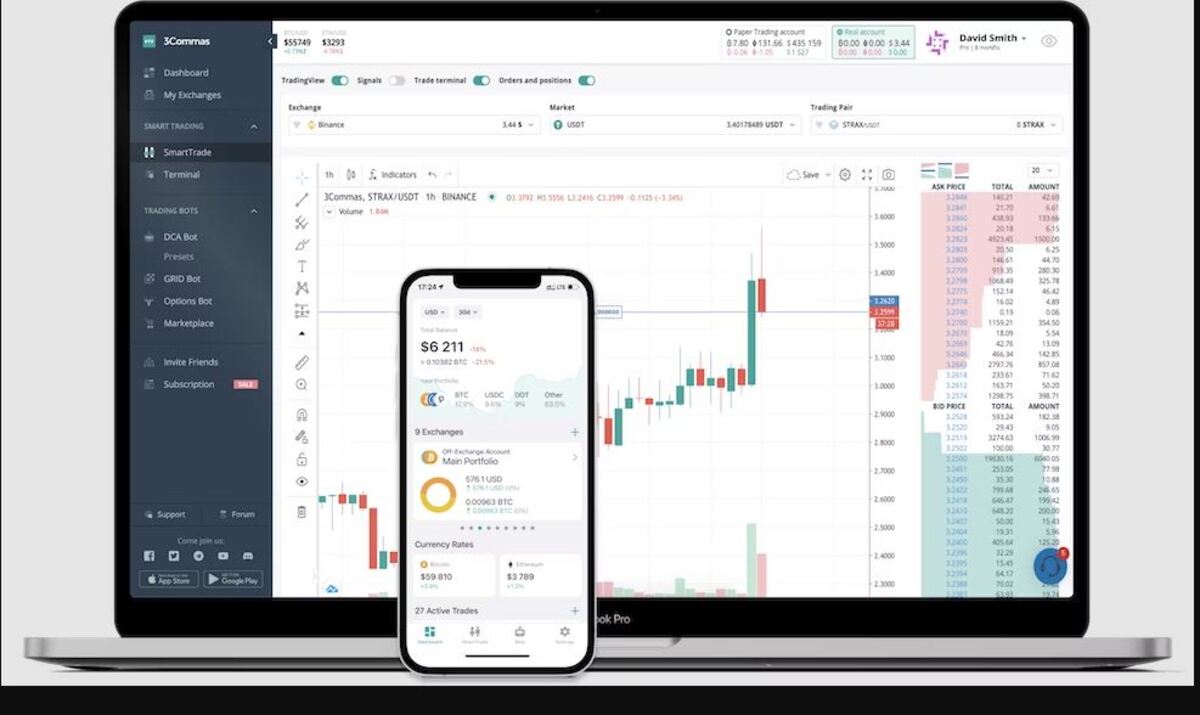What is Ethereum?
Ethereum is a decentralized, open-source blockchain platform that enables the execution of smart contracts and the development of decentralized applications (DApps). Created by Vitalik Buterin in 2014, Ethereum has quickly gained popularity and has become the second-largest cryptocurrency by market capitalization, after Bitcoin.
Unlike Bitcoin, which focuses solely on digital currency, Ethereum aims to provide a platform for building decentralized applications that operate on a blockchain. The native cryptocurrency of the Ethereum platform is called Ether (ETH), and it plays a crucial role in facilitating transactions and paying for computational services on the network.
One of the key features of Ethereum is the ability to write and deploy smart contracts. Smart contracts are self-executing contracts with predefined conditions and terms embedded into code. These contracts automatically execute actions when those conditions are met, eliminating the need for intermediaries.
Furthermore, Ethereum allows developers to create and deploy their own decentralized applications. These DApps have the potential to revolutionize various industries, including finance, supply chain management, healthcare, and more, by removing the reliance on centralized authorities and introducing transparency, security, and efficiency.
The Ethereum platform operates on a consensus mechanism called Proof of Stake (PoS), which is more environmentally friendly and energy-efficient compared to the Proof of Work (PoW) mechanism used by Bitcoin.
In summary, Ethereum is a blockchain platform that enables the creation of smart contracts and decentralized applications. It aims to revolutionize various industries by providing a secure, transparent, and efficient means of conducting transactions and executing programmable agreements.
How is the price of Ethereum determined?
The price of Ethereum, like any other cryptocurrency, is determined by supply and demand dynamics in the market. Various factors influence the perceived value of Ethereum, leading to fluctuations in its price. Understanding these factors can provide insights into the volatility and potential future movements of the cryptocurrency.
One of the primary drivers of Ethereum’s price is market demand. When there is high demand for Ethereum, buyers are willing to purchase it at a higher price, which leads to an increase in its value. Conversely, if there is a decrease in demand, the price tends to decline. Factors that influence demand include investor sentiment, market news, and overall adoption of Ethereum by individuals and institutions.
Another factor that impacts the price of Ethereum is the overall market sentiment towards cryptocurrencies. Since Ethereum is part of the broader cryptocurrency market, factors such as government regulations, security breaches, or positive news in the cryptocurrency industry can affect the price of Ethereum.
Additionally, the technological development and advancements of the Ethereum platform play a significant role in determining its price. Major upgrades or improvements to the Ethereum network, such as the recent Ethereum 2.0 upgrade, can positively impact the market sentiment towards Ethereum and potentially drive its price higher.
The overall economic conditions, such as inflation rates and interest rates, can also influence the price of Ethereum. During times of economic uncertainty or instability, investors may turn to alternative investments, including cryptocurrencies like Ethereum, which can drive up the demand and subsequently raise its price.
Lastly, market liquidity and trading volume are essential factors in determining the price of Ethereum. Higher liquidity and trading volume indicate a healthier market, as there is increased participation and easier access to buying and selling Ethereum. Conversely, lower liquidity and trading volume can lead to higher price volatility and potentially wider bid-ask spreads.
In summary, the price of Ethereum is determined by the interplay of various factors, including market demand, overall market sentiment, technological developments, economic conditions, market liquidity, and trading volume. Understanding these factors can provide insights into the price movements of Ethereum, but it’s important to note that cryptocurrency markets are highly volatile and subject to rapid changes.
How much is 1 Ethereum worth?
The value of 1 Ethereum, represented by its cryptocurrency symbol ETH, is constantly changing due to market dynamics and investor sentiment. The price of 1 Ethereum is determined by supply and demand forces in the cryptocurrency market.
As of [current date], the price of 1 Ethereum is approximately [current price]. However, it’s important to note that cryptocurrency prices can be highly volatile and subject to rapid fluctuations. Therefore, the price of 1 Ethereum can vary significantly within a short period of time.
The price of Ethereum is quoted in various currency pairs, including popular options like ETH/USD, ETH/EUR, and ETH/BTC. These pairs represent the value of 1 Ethereum in the respective currencies, providing a benchmark for traders and investors.
To determine the current price of 1 Ethereum, one can check cryptocurrency exchanges or financial websites that provide real-time price data. These platforms display the bid and ask prices, as well as the recent trading history of Ethereum, allowing users to make informed decisions based on the prevailing market conditions.
It’s worth mentioning that cryptocurrency prices are influenced by several factors, including market demand, overall market sentiment, regulatory developments, and technological advancements. As a result, the value of 1 Ethereum can experience significant fluctuations in response to news events or market trends.
Furthermore, it’s important to consider that the price of Ethereum can vary slightly between different cryptocurrency exchanges due to factors such as liquidity and exchange-specific factors.
In summary, the value of 1 Ethereum is determined by market dynamics, investor sentiment, and various external factors. The price of Ethereum can fluctuate rapidly, making it essential for investors and traders to stay updated with real-time market information.
Factors that influence the value of Ethereum
Several factors can influence the value of Ethereum, resulting in fluctuations in its price. Understanding these factors can provide insights into the potential drivers of Ethereum’s value and help investors make informed decisions.
1. Market demand: The level of demand for Ethereum plays a crucial role in determining its value. Increased demand from individuals, businesses, and institutions can drive up the price of Ethereum, while decreased demand can lead to a decline in its value.
2. Overall market sentiment: The broader sentiment towards cryptocurrencies and the overall market conditions can impact Ethereum’s value. Positive news, such as regulatory clarity or institutional adoption, can boost market sentiment and drive up the price. Conversely, negative news or market uncertainty can have the opposite effect.
3. Technological developments: Upgrades, innovations, and advancements in the Ethereum platform can influence its value. These developments can enhance scalability, security, and functionality, attracting more users and increasing demand for Ethereum.
4. Regulatory environment: Government regulations and policies regarding cryptocurrencies can have a significant impact on Ethereum’s value. Favorable regulations that promote adoption and use of Ethereum can boost its value, while restrictive regulations or bans can negatively affect its price.
5. Competition from other cryptocurrencies: The emergence of new cryptocurrencies or the advancement of established competitors can impact Ethereum’s value. Increased competition for adoption and investment can potentially divert attention and resources away from Ethereum, affecting its value.
6. Investor behavior and speculation: Investor sentiment, including buying and selling patterns, can influence Ethereum’s value. Speculation, emotional decision-making, and market psychology can lead to price volatility and short-term fluctuations in Ethereum’s value.
7. Economic factors: Broader economic conditions, such as inflation rates, interest rates, and macroeconomic trends, can influence the value of Ethereum. During periods of economic uncertainty or inflationary pressures, investors may turn to cryptocurrencies as a hedge, potentially driving up the price of Ethereum.
8. Network usage and adoption: The level of network usage and adoption of decentralized applications (DApps) built on the Ethereum platform can impact its value. Increased usage and demand for Ethereum-based applications can positively affect its value.
9. Liquidity and trading volume: The liquidity and trading volume of Ethereum can impact its value and price stability. Higher liquidity and trading volume attract more participants, enhance price discovery, and reduce the risk of manipulation.
In summary, the value of Ethereum is influenced by market demand, overall market sentiment, technological developments, regulatory environment, competition, investor behavior, economic factors, network usage, and liquidity. Monitoring these factors can provide valuable insights into the potential drivers of Ethereum’s value and its future price movements.
How can I convert Ethereum to fiat currency?
If you own Ethereum (ETH) and wish to convert it into fiat currency, there are several options available to facilitate the conversion. Here are some common methods:
1. Cryptocurrency Exchanges: The most popular and widely used method to convert Ethereum to fiat currency is through cryptocurrency exchanges. These platforms allow users to trade their Ethereum for various fiat currencies, such as USD, EUR, or GBP. Simply create an account on a reputable exchange, deposit your Ethereum, and sell it for your desired fiat currency.
2. Peer-to-Peer (P2P) Trading: Another option is to engage in peer-to-peer trading. P2P platforms connect individuals who want to buy or sell Ethereum directly, without the need for an intermediary. Through P2P trading, you can find buyers who are willing to purchase Ethereum in exchange for fiat currency, enabling you to convert your Ethereum into cash.
3. Over-the-Counter (OTC) Trading: OTC trading involves making large cryptocurrency transactions outside of traditional exchanges. OTC desks or brokers facilitate these trades, allowing individuals to convert large amounts of Ethereum into fiat currency without impacting the market. OTC trading is typically utilized by institutional investors or individuals looking to exchange significant amounts of cryptocurrency.
4. Cryptocurrency Payment Processors: Some payment processors accept Ethereum as a form of payment and allow merchants to convert it into fiat currency instantly. By utilizing such services, you can make purchases directly with your Ethereum, and the payment processor will handle the conversion into your desired fiat currency for the merchant.
5. Crypto Debit Cards: Crypto debit cards are linked to your cryptocurrency wallet and allow you to spend your Ethereum as fiat currency in real-world situations. These cards automatically convert your Ethereum into the local currency when making a purchase, making it a convenient way to spend your cryptocurrency while seamlessly converting it to fiat.
6. Over-the-Counter (OTC) Desks: Some exchanges or brokerage services offer OTC desks where you can directly convert your Ethereum into fiat currency. OTC desks often cater to institutional or high-net-worth individuals and provide personalized services for large-scale transactions.
Before choosing a method to convert Ethereum to fiat currency, it is essential to consider factors such as fees, security, liquidity, and regulatory compliance. Conduct research and choose a reputable and reliable service provider that meets your requirements.
It’s important to note that the conversion process may require some form of identity verification, especially when dealing with regulated platforms and larger transactions. Additionally, tax obligations may apply when converting Ethereum into fiat currency, so it is crucial to be aware of any applicable tax regulations in your jurisdiction.
In summary, converting Ethereum to fiat currency can be done through cryptocurrency exchanges, peer-to-peer trading, OTC trading, cryptocurrency payment processors, or crypto debit cards. Each method has its own advantages and considerations, so it’s important to choose a method that suits your preferences and requirements.
How much is 3 Ethereum worth?
The value of 3 Ethereum (ETH) is constantly changing due to market dynamics and fluctuations in the cryptocurrency market. At the time of writing, the price of 1 Ethereum is approximately [current price]. Therefore, to determine the value of 3 Ethereum, you would multiply the current price by the quantity of Ethereum.
For example, if 1 Ethereum is worth $2,000, then 3 Ethereum would have a value of $6,000 (3 x $2,000). It’s important to note that cryptocurrency prices are highly volatile and can experience rapid fluctuations within a short period of time.
To get the most accurate and up-to-date value of 3 Ethereum, you can check cryptocurrency exchanges or financial websites that provide real-time price data. These platforms display the current price of Ethereum and allow you to calculate the value of your holdings based on the prevailing market conditions.
It’s worth mentioning that the value of 3 Ethereum may vary slightly between different cryptocurrency exchanges due to factors such as liquidity, trading volume, and exchange-specific factors. Therefore, it is recommended to check multiple platforms to ensure you are getting the best value for your 3 Ethereum.
Furthermore, the value of 3 Ethereum can be influenced by various factors such as market demand, overall market sentiment, technological developments, and economic conditions. It’s important to stay informed about these factors and monitor the market to make informed decisions regarding the value and potential future movements of your 3 Ethereum.
In summary, the value of 3 Ethereum can be calculated by multiplying the current price of 1 Ethereum by the quantity of Ethereum. However, due to the volatility of cryptocurrency prices, it’s crucial to stay updated with real-time market information to determine the most accurate value of your 3 Ethereum holdings.
Is it a good time to buy Ethereum?
Determining whether it is a good time to buy Ethereum (ETH) depends on several factors, including market conditions, individual investment goals, risk tolerance, and time horizon. It’s important to note that cryptocurrency markets can be highly volatile and subject to rapid price fluctuations.
1. Market Analysis: Conducting a thorough analysis of the cryptocurrency market can provide insights into the current trends and potential future movements of Ethereum. This analysis may include technical analysis, fundamental analysis, and studying market indicators to identify potential buying opportunities.
2. Consider Your Investment Goals: Consider why you want to invest in Ethereum. Are you looking for long-term investment growth or short-term speculative gains? Understanding your investment goals can help determine the best time to buy Ethereum.
3. Research and Due Diligence: Before investing in Ethereum, it is crucial to research and understand the technology, team, and overall adoption of the cryptocurrency. Stay updated with news, advancements, and regulatory developments that can impact Ethereum’s value.
4. Dollar-Cost Averaging (DCA): Instead of trying to time the market, you can consider using a strategy called dollar-cost averaging. With DCA, you invest a fixed amount of money in Ethereum at regular intervals, regardless of the price. This approach can help mitigate the impact of short-term price fluctuations.
5. Risk Management: Evaluate your risk tolerance and allocate an appropriate portion of your investment portfolio to Ethereum. Diversify your investments across different assets to spread the risk and potentially mitigate losses.
6. Consult Professionals: It may be helpful to seek advice from financial professionals or cryptocurrency experts to gain additional insights and guidance on the timing of your Ethereum investment.
7. Long-Term Outlook: Consider the long-term potential of Ethereum as an innovative technology that underpins decentralized applications and smart contracts. Evaluate factors such as adoption, scalability improvements, and potential real-world use cases that could drive future demand for Ethereum.
It’s important to remember that investing in cryptocurrencies carries risks, and there are no guarantees of returns. Prices can be highly volatile, and market conditions can change rapidly. Careful analysis, research, and understanding of your personal financial situation are crucial before making any investment decisions.
In summary, the decision of whether it is a good time to buy Ethereum depends on various factors, including market analysis, investment goals, risk tolerance, and personal research. It’s important to approach cryptocurrency investing with caution and make informed decisions. Considering these factors and consulting with professionals can help determine the most suitable time to buy Ethereum.
Conclusion
Ethereum has emerged as a leading blockchain platform, offering decentralized applications and smart contract functionality. The value of Ethereum fluctuates based on supply and demand dynamics, market sentiment, technological developments, and various external factors. Understanding these factors can provide insights into the potential drivers of Ethereum’s value.
To convert Ethereum to fiat currency, individuals can utilize cryptocurrency exchanges, peer-to-peer trading, OTC desks, cryptocurrency payment processors, or crypto debit cards. Each method has its own advantages and considerations, so it’s important to choose a method that suits individual preferences and requirements.
When determining whether it is a good time to buy Ethereum, investors should analyze market conditions, consider their investment goals, conduct research and due diligence, and manage risk effectively. Employing strategies like market analysis, dollar-cost averaging, and seeking professional advice can help with informed decision-making.
However, it is crucial to remember that investing in Ethereum or any other cryptocurrency carries inherent risks. Prices can be highly volatile, and market conditions can change rapidly. It is recommended to invest only what one can afford to lose and to approach cryptocurrency investments with a long-term perspective.
In conclusion, Ethereum has gained significant popularity and has become a major player in the cryptocurrency market. By staying informed about market trends, technological advancements, and regulatory developments, individuals can navigate the Ethereum ecosystem and make informed decisions regarding their investments.

























